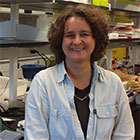Francesca Storici, PhD, National Institute of Environmental Health Sciences/NIH*

Francesca Storici, PhD
*Now affiliated with Georgia Institute of Technology.
The Storici laboratory is interested in elucidating mechanisms of DNA recombination and repair and developing approaches for genetic engineering and gene targeting. A major focus of our lab's research is to understand the relationship between RNA and DNA in genome stability/instability and DNA modification.
Products
References
- Katz, S., and Storici, F. (2014). Genetic modification stimulated by the induction of a site-specific break distant from the locus of correction in haploid and diploid yeast. In: “Methods in Molecular Biology”, Edited by F. Storici. Humana Press, New York, NY; 1114:308-324.
- Stuckey, S., and Storici, F. (2013) Gene Knockouts, in vivo Site-Directed Mutagenesis and Other Modifications Using the Delitto Perfetto System in Saccharomyces cerevisiae. In Jon Lorsch, editors: Laboratory Methods in Enzymology: Cell, Lipid and Carbohydrate, Vol 533, MIE, UK: Academic Press, 2013, pp. 103-132.
- Stuckey, S., Mukherjee, K., and Storici, F. (2011). In vivo site-specific mutagenesis and gene collage using the delitto perfetto system in yeast Saccharomyces cerevisiae. In: “Methods in Molecular Biology”, Edited by: H. Tsubouchi. Humana Press Inc., New York, NY; 745:173-191.
- Storici F, Durham CL, Gordenin DA, Resnick MA. Chromosomal site-specific double-strand breaks are efficiently targeted for repair by oligonucleotides in yeast. Proc Natl Acad Sci U S A. 2003 Dec 9;100(25):14994-9. Epub 2003 Nov 20.
- Storici F, Resnick MA. Delitto perfetto targeted mutagenesis in yeast with oligonucleotides. Genet Eng (N Y). 2003;25:189-207. Review.
- Storici F, Lewis LK, Resnick MA. In vivo site-directed mutagenesis using oligonucleotides. Nat Biotechnol. 2001 Aug;19(8):773-6.


